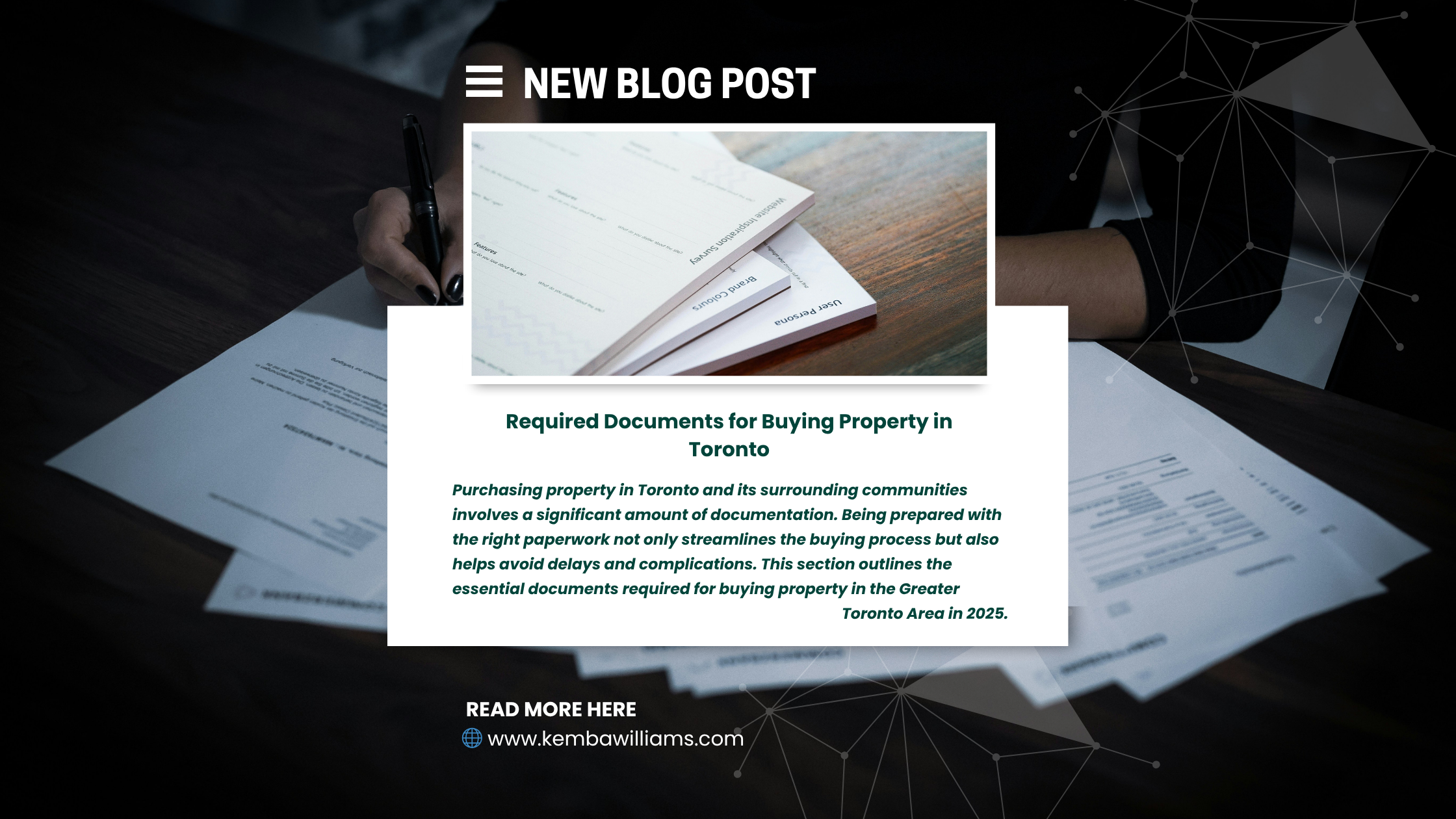Required Documents for Buying Property in Toronto
Purchasing property in Toronto and its surrounding communities involves a significant amount of documentation. Being prepared with the right paperwork not only streamlines the buying process but also helps avoid delays and complications. This section outlines the essential documents required for buying property in the Greater
Toronto Area in 2025.
Personal Identification Requirements
All buyers must provide proper identification to verify their identity:
- Government-issued photo ID: Valid passport, driver’s license, or Ontario Photo Card
- Social Insurance Number (SIN): Required for tax purposes and verification
- Proof of address: Utility bills, bank statements, or government documents showing current address
- Contact information: Email address, phone number, and mailing address
For couples or multiple buyers purchasing together, each individual must provide these documents. Non-Canadian residents will need additional identification, including immigration documents or foreign passports.
Financial Documentation Needed
Lenders and legal professionals require comprehensive financial documentation:
For Mortgage Pre-Approval and Financing
- Employment verification: Letter of employment stating position, salary, and length of employment
- Income proof: Recent pay stubs (usually last 2-3 months)
- Notice of Assessment: Last two years’ tax returns and NOAs from Canada Revenue Agency
- Bank statements: Last 3-6 months of statements from all accounts
- Investment statements: RRSP, TFSA, and other investment account statements
- Down payment proof: Bank statements showing accumulated funds and source of down payment
- Gift letter: If receiving financial help from family, a formal gift letter is required
- Credit report: Lenders will check your credit score and history
- Debt documentation: Statements for existing loans, credit cards, and other debts
Property Purchase Documentation
Once you’ve found a property and are ready to make an offer, you’ll need:
For Making an Offer
- Agreement of Purchase and Sale: The formal offer document prepared by your real estate agent
- Deposit: Usually provided as a bank draft or certified cheque (typically 5% of purchase price)
- Proof of funds: Bank statements showing you have the down payment and closing costs
- Pre-approval letter: Confirmation from your lender that you qualify for financing
- Identification for real estate professionals: Your agent will require ID to confirm your identity
For Home Inspection and Due Diligence
- Home inspection report: Not mandatory but highly recommended
- Status Certificate: For condominium purchases, reviewing the building’s financial and legal status
- Property survey: If available from the seller
- Property disclosure statement: Seller’s declaration of property condition and known issues
Legal and Tax Documents
The closing process requires additional documentation:
For Closing
- Land transfer tax affidavit: Declaration regarding the property’s use and value
- Statement of Adjustments: Outlines financial adjustments between buyer and seller
- Title insurance application: Protection against title defects and fraud
- Property insurance proof: Evidence of home insurance effective on closing date
- Mortgage instructions: Formal mortgage agreement from your lender
- Void cheque or direct deposit form: For property tax and mortgage payments
- Declaration of residency: Confirmation of whether you’re a Canadian resident for tax purposes
For Tax Purposes
- Land Transfer Tax forms: Provincial and, for Toronto properties, municipal tax forms
- HST rebate forms: For new construction properties
- First-time homebuyer rebate applications: If eligible for provincial or municipal rebates
- Non-resident tax documentation: If applicable for foreign buyers
Additional Requirements for Foreign Buyers
Non-Canadian buyers face additional documentation requirements:
- Confirmation of exemption status: Documentation proving exemption from the foreign buyer ban
- International credit reports: From recognized credit bureaus in your home country
- Reference letters: From financial institutions in your home country
- Larger down payment proof: Foreign buyers typically need 35-50% down payment
- Source of funds verification: More extensive documentation of fund origins
- Immigration documents: Visa, study permit, or work permit if applicable
Digital Documentation Considerations
In 2025, many aspects of real estate transactions have moved online:
- Digital signatures: Many documents can be signed electronically
- Secure document sharing: Platforms for sharing sensitive financial information
- Virtual ID verification: Some processes allow remote identity verification
- Online title searches: Digital access to property records
- Electronic funds transfers: For deposits and closing costs
However, some documents still require original signatures or notarization, so buyers should be prepared for both digital and physical documentation requirements.
Document Organization Tips
To streamline the buying process:
- Create a dedicated email folder for real estate communications
- Maintain a digital and physical filing system for all documents
- Scan physical documents as backups
- Keep multiple copies of critical documents
- Respond promptly to requests for additional information
- Work with professionals who can guide you through documentation requirements
Working with Professionals
Several professionals can help navigate documentation requirements:
- Real estate agent: Guides offer preparation and submission
- Mortgage broker: Assists with financing documentation
- Real estate lawyer: Handles legal documentation and closing
- Accountant: Advises on tax implications and documentation
- Financial advisor: Helps organize financial documentation
These professionals can provide checklists specific to your situation and ensure you have all necessary documents ready at each stage of the buying process.
Having all required documentation organized and readily available will significantly reduce stress and potential delays in your property purchase. Working with experienced professionals familiar with Toronto’s real estate market will help ensure you’ve covered all documentation requirements specific to your unique situation.
